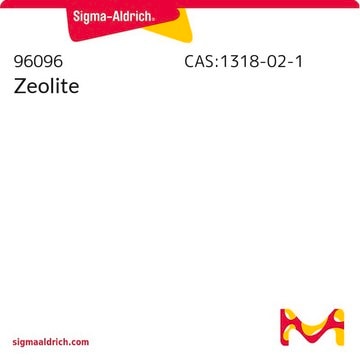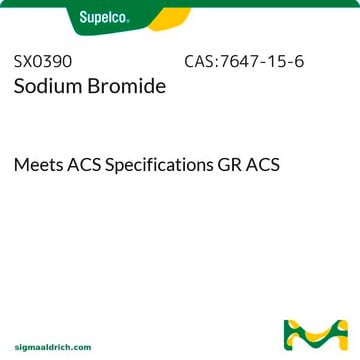793574
Sodium bromide
anhydrous, free-flowing, Redi-Dri™, ACS reagent, ≥99%
About This Item
Productos recomendados
grade
ACS reagent
anhydrous
Quality Level
vapor pressure
1 mmHg ( 806 °C)
product line
Redi-Dri™
assay
≥99%
form
powder
quality
free-flowing
impurities
≤0.005% insolubles
pH
5.0-8.8 (25 °C, 5%)
mp
755 °C (lit.)
anion traces
bromate (BrO3-): ≤0.001%
chloride (Cl-): ≤0.2%
sulfate (SO42-): ≤0.002%
cation traces
Ba: ≤0.002%
Ca: ≤0.002%
Fe: ≤5 ppm
K: ≤0.1%
Mg: ≤0.001%
heavy metals: ≤5 ppm (by ICP-OES)
SMILES string
[Na+].[Br-]
InChI
1S/BrH.Na/h1H;/q;+1/p-1
InChI key
JHJLBTNAGRQEKS-UHFFFAOYSA-M
¿Está buscando productos similares? Visita Guía de comparación de productos
General description
Application
- Sensitive and Low-Noise Perovskite Nanocrystal-Organic Bulk Heterostructure X-ray Detectors Enabled by Sodium Bromide-Assisted In Situ Reparation: This research underscores the role of sodium bromide in enhancing the fabrication of perovskite nanocrystals for advanced X-ray detection technologies, illustrating its utility in high-precision imaging applications critical for both medical and industrial use (Li Y, Fang Y, 2024).
- Surface-Modified Carboxylated Cellulose Nanofiber Hydrogels for Prolonged Release of Polyhexamethylene Biguanide Hydrochloride (PHMB) for Antimicrobial Applications: Demonstrates the effectiveness of sodium bromide in modifying cellulose nanofibers for use in sustained drug release systems, highlighting its importance in the development of antimicrobial materials (O-Chongpian P, Jantrawut P, 2023).
- Unravelling Alkali-Metal-Assisted Domain Distribution of Quasi-2D Perovskites for Cascade Energy Transfer toward Efficient Blue Light-Emitting Diodes: Details the utilization of sodium bromide in the synthesis of quasi-2D perovskites, paving the way for improvements in blue light-emitting diode (LED) technology which is crucial for display and lighting solutions (Cai W, Yip HL, 2022).
- Chronic sodium bromide treatment relieves autistic-like behavioral deficits in three mouse models of autism: Highlights the potential therapeutic applications of sodium bromide in neuropsychiatric disorders, providing insights into its efficacy in alleviating symptoms of autism within experimental settings (Derieux C, Becker JAJ, 2022).
- Development of Flexible Plasticized Ion Conducting Polymer Blend Electrolytes Based on Polyvinyl Alcohol (PVA): Chitosan (CS) with High Ion Transport Parameters Close to Gel Based Electrolytes: Showcases the role of sodium bromide in the development of high-performance polymer electrolytes for energy storage applications, demonstrating its impact on enhancing ion transport properties (Sadiq NM, Kadir MFZ, 2022).
Legal Information
signalword
Warning
hcodes
Hazard Classifications
Repr. 2 - STOT RE 2 - STOT SE 3
target_organs
Central nervous system
Storage Class
13 - Non Combustible Solids
wgk_germany
WGK 1
flash_point_f
Not applicable
flash_point_c
Not applicable
Elija entre una de las versiones más recientes:
¿Ya tiene este producto?
Encuentre la documentación para los productos que ha comprado recientemente en la Biblioteca de documentos.
Los clientes también vieron
Artículos
Redi-Dri™ prevents hygroscopic powders, such as inorganic salts, from absorbing moisture and forming clumps, leaving the salts free-flowing every time.
Redi-Dri™ prevents hygroscopic powders, such as inorganic salts, from absorbing moisture and forming clumps, leaving the salts free-flowing every time.
Redi-Dri™ prevents hygroscopic powders, such as inorganic salts, from absorbing moisture and forming clumps, leaving the salts free-flowing every time.
Redi-Dri™ prevents hygroscopic powders, such as inorganic salts, from absorbing moisture and forming clumps, leaving the salts free-flowing every time.
Nuestro equipo de científicos tiene experiencia en todas las áreas de investigación: Ciencias de la vida, Ciencia de los materiales, Síntesis química, Cromatografía, Analítica y muchas otras.
Póngase en contacto con el Servicio técnico












